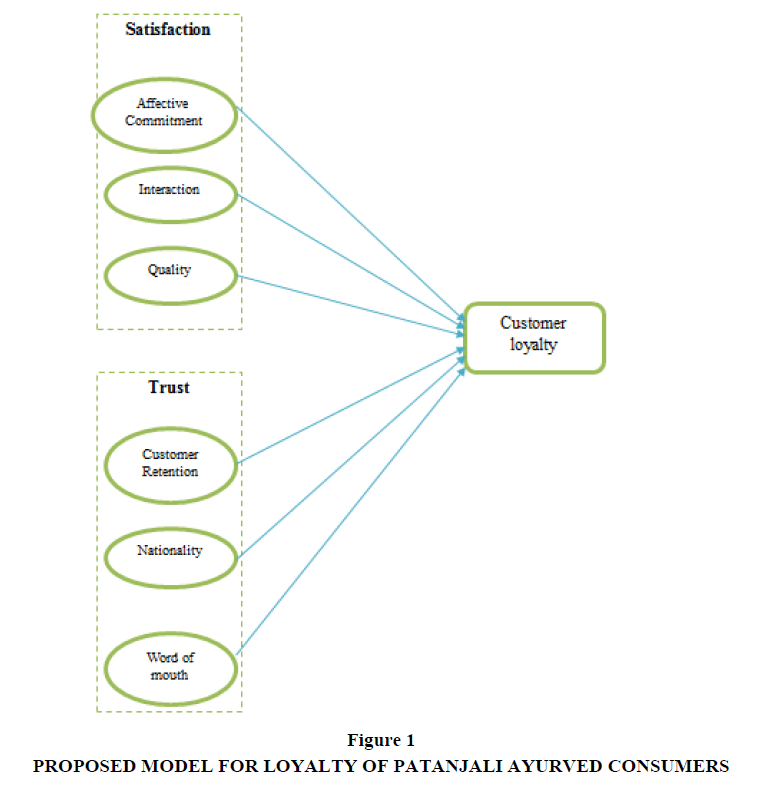Research Article: 2021 Vol: 25 Issue: 6
Examining the Loyalty of Customers for Patanjali Ayurved Limited In India
Shagun Chib, Academic Associate, Strategic Management, IIM Indore
Vinita Sahay, Professor and Director, IIM Bodhgaya
H.G Mishra, Associate Professor, SMVD University, Katra
Citation: Chib., S. Sahay., V, & Mishra, H.G. (2021). Examining the loyalty of customers for patanjali ayurved limited in India. Academy of Marketing Studies Journal, 25(6), 1-4.
Abstract
Keywords
Patanjali Ayurved Ltd, Grounded Theory, Qualitative Research, Customer Loyalty, Gioia Method.
Introduction
Customer loyalty is a long-lasting asset of any company across the world. Customer is the king and makes them loyal towards an organization is essential for companies' long-term survival. Customer loyalty has been primarily defined as concerning an individual's relative attitude and repeated patronage behavior towards an entity, product, or service, which leads us to the vital theme of discussion in this paper. FMCG Industry has shown tremendous growth in recent years, and it is evident as the FMCG industry is the 4th largest sector contributing to the Indian economy, and the retail sector in India is likely to rise at 20-25 percent per annum.
Customer Loyalty is an intensely held activity to re-purchase or to frequently purchase a favored product and service in the future period to time despite several marketing attempts, and situational impacts are having the likelihood of causing switching behavior among the customers.
Literature Review
Patanjali Ayurved Ltd
Patanjali started its business as a small pharmacy store in Haridwar in the year 1997 and incorporated as a private limited company in 2006 and soon a year after in 2007 it was ventured as a public listed company, the company in the initial years focused on manufacturing of Ayurvedic medicines (now sold under Divya brand name of Patanjali) and then shifted its focus towards production and manufacturing of FMCG products, the company over the years has grown into a powerful enterprise of Rupees 100 billion by FY 2017 becoming first ever FMCG company in Figure 1 within a decade of incorporation (Tanwar, 2019). In this competitive era, only those brands can survive in the emotionally and symbolically connected markets with the consumers.
The Ayurveda section is the crucial performing section of the Patanjali brand. The Patanjali Ayurved Limited is one the fastest growing company in India, and the main products of the Patanjali brand include "Patanjali Desi Ghee, Patanjali Dant Kanti toothpaste, Patanjali Kesh Kanti shampoo, Patanjali herbal bath soap, and Patanjali Honey." However, Patanjali's market saturation is still a big issue to be taken care of as it is still far behind its competitors as Patanjali has only 15.1% of market share whereas Dabur has 54.1% and Zandu has 16.1% (Tyagi, 2016).
Customer Loyalty
One of the most important aspects of relationship marketing is customer loyalty, particularly for services and marketing industries, as customer loyalty leads to re-purchase and creation of long-term relationships with the customers. Customer Loyalty is a company's most valuable and powerful asset, and by establishing Customer Loyalty, a company creates a long term ongoing relationship with the customers. As suggested, a company must serve its loyal customers as they help the industry in the repeated use of its services and more use of the company products. A customer becomes loyal when he/she continuously purchases from the same service provider whenever viable, and who keep on recommending or maintaining useful perspective towards the person providing service.
Research Methodology
Since the current study's focal point is on investigating the customers' loyalty, we selected our samples, i.e., customers from Jammu and Kashmir, Punjab, Himachal Pradesh, and Indore, India. The current study includes data collection using semi-structured in-depth interviews performed by the authors in person. The interviews were conducted at an average time of 35-40 minutes. Semi-structured in-depth interviews were done for collecting data. The detailed description can be seen in Table 1. The interviews were done until data saturation was attained. Data saturation is when there are no changes in the respondents' data, and repetitive conditions start occurring, leading to no further changes in data conditions. Simple random sampling was used in the selection of customers. All the interviews performed were then written in a word by word form as detailed by the respondents.
Data Analysis
The research on loyalty towards Ayurvedic products, especially in context to Patanjali Ayurved Limited, is very sparse. Hence, there is ample scope for developing indigenous constructs and newer theories explaining consumers' loyalty towards Patanjali Ayurved Limited is a religious nation like India. Thus, an Inductive approach is preferred over a deductive one. A variant of Grounded theory known as Gioia methodology has been used in the current research to understand the factors affecting customer loyalty towards products of Patanjali Ayurved Limited.
The themes generated from the qualitative interviews of the customers are explained below in the results section:
Discussion and Implications
Patanjali has achieved great success in formulizing strategies to form loyal customers. This study will benefit Patanjali Ayurved ltd as they can use their business strategies more efficiently to create more loyal customers in the future. Our study highlights the importance of customer loyalty in the case of Patanjali. Patanjali can use transactional data and details of customer purchasing their products online for research and data analytics to create various customer segments to increase efficiency in their various strategies. As far as the authors know, no previous study was conducted to investigate loyalty in Patanjali Ayurved ltd using grounded theory. Patanjali is an example to all the FMCG brands that disturb which interrupts the smooth going of an organization can take place at any point in time, and incorporation of competitive strategies and marketing intelligence is a must to prevent such significant hazards.
References
- Tanwar, S. (2019). Ramdev’s Patanjali seems to have left behind a brief red patch. Retrieved 4 July 2020, from https://qz.com/india/1766945/ramdevs-patanjali-bounces-back-staving-off-hul-dabur/
- Tyagi, N. (2016). Baba Ramdev’s Patanjali far behind Dabur and Zandu in reach. Economic Times. Retrieved on 6 June 2016 from http://economictimes.indiatimes.com/industry/cons-products/fmcg/baba-ramdevs-Patanjali-far-behind-dabur-and-zandu-in-reach/articleshow/52408768.cms
